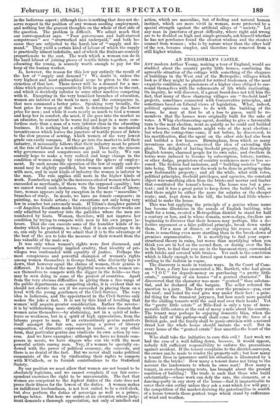AN ENGLISHMAN'S CASTLE.
ANY modern Arthur Young, making a tour of England, would see studded about the country pretty little houses, combining the agreeable situation of the cottage with something of the elegance of buildings in the West end of the Metropolis ; villages which look as if they might be planted for retired tradesmen of the most exquisite condition, or pensioners of a higher class obliged to sur- round themselves with the refinements of life while rusticating. On inquiry, he will discover, if a great board does not tell him the fact, that many of these charming villages are " freehold land" projects, sometimes connected with Conservative principles, and sometimes based on Liberal views of legislation. 'What, indeed, political opinions can have to do with the building of the house, he may at first be at a loss to guess, until he re- members that the houses were originally built for the sake of votes. A Whig electioneering-agent, desiring to give a favourable turn to the next election, went as quietly as he could and builded a few houses, that the tenants might -vote at the next election ; but when the voting-time came, if not before, he discovered, to his mortification, that the agent on the other side had also been and builded a few houses. Birmingham, from which so many inventions are derived, conceived the idea of extending this plan. The delight of having freehold property, that thoroughly English tenure, charmed people for its own sake, and dwellers in towns were induced to become by subscription, lottery, tontine, or other dodge, proprietors of country residences more or less se- cured. The fashion had imitators, and " building societies " came into being. Then agents saw the work to be done in getting up this now fashionable property ; and all the while, what with votes, political principles, freehold privileges, and agencies, the constant object waStomething alien from the bricks and mortar and timber that constituted the tenant's house. The house was but a pre- text ; and it was a great point to keep down the builder's bill, so that there might be either the more for salaries or the cheaper rents ; and, kept down in his bill, the builder had little where- withal to make the house.
This was but applying the principle of a genius whose name has become illustrious in the annals of English building, who built for a term, created a Metropolitan district to stand for half a century or less, and in whose domain, now-a-days, dwellers are beginning to discover that their housess may perhaps, like a de- fective argument or a false political principle, break down under them. For a man at dinner, or enjoying his repose at night, there is something even more startling than in the break-down of premises argumentative. It is mortifying to find your super- structural theory in ruins, but worse than mortifying when you think you are in bed on the second floor, or dozing over the fire in the first, to find that you are in the basement story, surrounded with bricks and covered with bruises. Yet such is the conviction which is likely enough to be forced upon tenants and owners ac- cording to the fashion in vogue.
The discovery is made in various ways. In the Court of Com- mon Pleas, a Jury has exonerated a Mr. Bartlett, who had given an " I 0 U " for deposit-money on purchasing " a pretty little estate," consisting of six houses "of a genteel character." He discovered that the character was more ' genteel " than substan- tial, and he declared off the bargain. The seller referred the question to a jury. The Jury went over the premises—yea, over the roof ; and found the roof give way under their feet : a pain- ful thing for the transient jurymen, but how much more painful for the abiding tenants with the said roof over their heads ! Yet the " pretty little estate" at Mile-End is only a type of innu- merable little estates at the end of many a mile about the country The tenant may perhaps be enjoying domestic bliss, when the middle half of the parlour-wall shall come in by the force of a British gale, and the family shall be panic-stricken with a natural dread lest the whole house should imitate the wall. But in every house of the " genteel estate" fear unsettles the heart of the tenant.
Who shall take the initiative to cure this evil ? Last week we had the case of a wall falling down, because, it would appear, nobody felt sufficient responsibility to enforce the precautions against accident. If the tenant complains to the district-surveyor, the owner can be made to render the property safe ; but how many a tenant lives in ignorance until his situation is illustrated by a failure in the bricks ! How many a tenant dares not bring to the account the landowners to whom he owes rent ! How many a tenant, in over-cheapening rents, has brought about the present condition of building ! The trade is such that those who build substantially—whose work can defy the rats, the elements, or a dancing-party in any story of the house—find it impracticable to cover their own outlay unless they ask a rent which few will pay ; the competition of the market drawing the paterfamilias in search of a house towards those genteel traps which stand by sufferance of wind and weather.


























 Previous page
Previous page